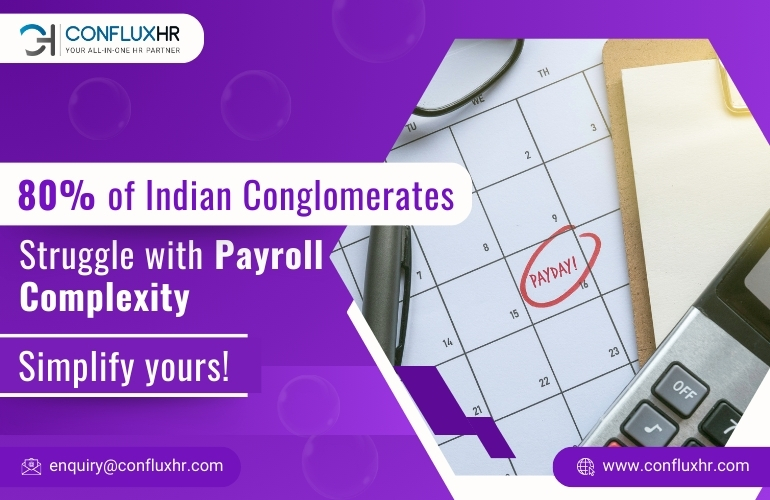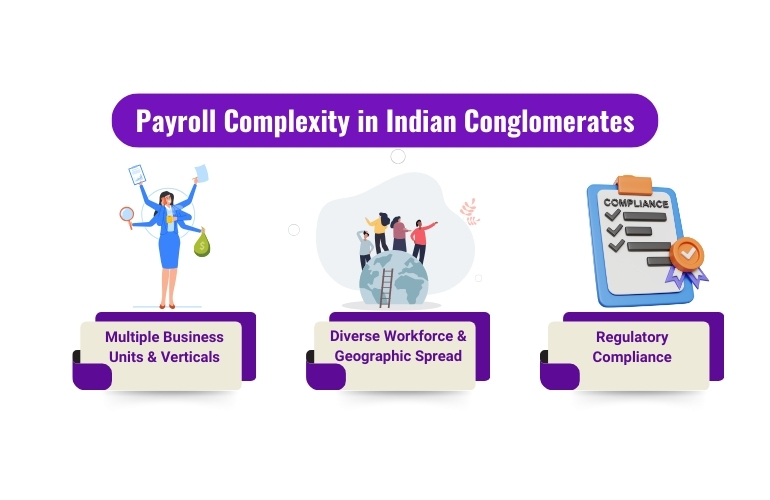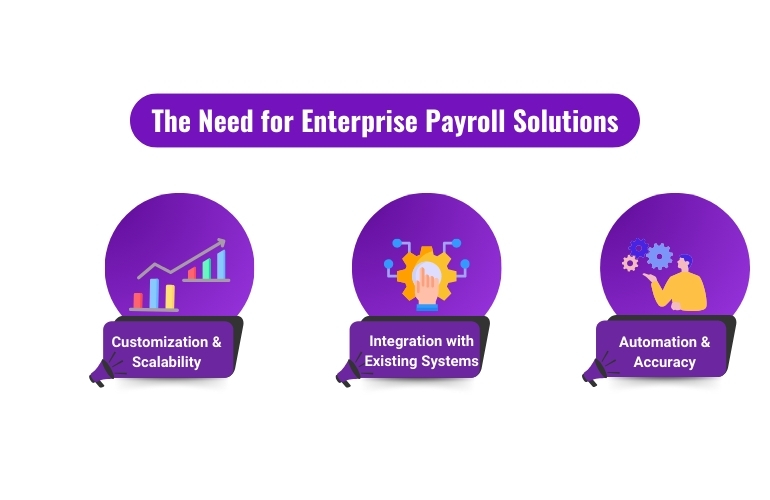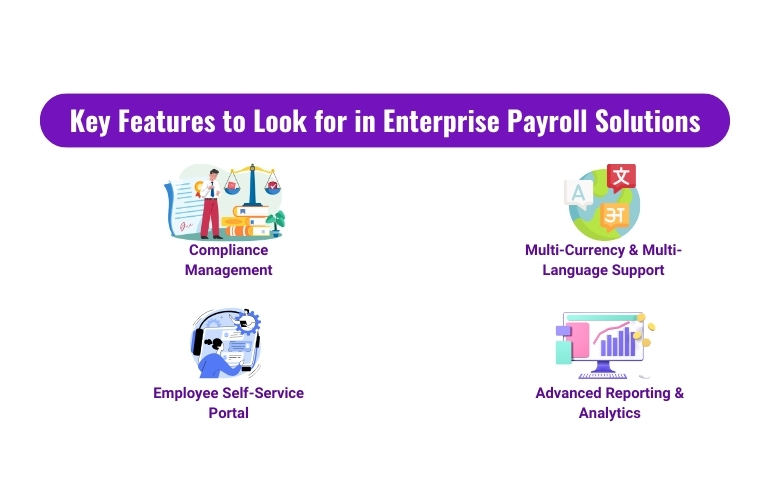Indian conglomerates are a testament to the diversity and growth of the nation’s economy. Companies like Tata Group, Reliance Industries, and Infosys operate across multiple sectors, each with its unique challenges. Managing such vast operations is no small feat, and one of the most intricate tasks is payroll management. With thousands of employees spread across various business units and geographies, ensuring efficient payroll management becomes critical. Not only does it play a vital role in employee satisfaction, but it also ensures compliance with a complex web of regulatory requirements.
Understanding Payroll Complexity in Indian Conglomerates
The payroll management process in Indian conglomerates is fraught with challenges. These challenges stem from the sheer scale and diversity of their operations.
Multiple Business Units & Verticals
Indian conglomerates often operate in multiple industries, from automotive and steel to IT and retail. Each industry has its payroll requirements, benefits structure, and compliance needs. For example, Tata Group’s automotive sector might have different payroll complexities compared to its IT division. Managing these varied requirements under one umbrella can be overwhelming without the right tools.
Diverse Workforce & Geographic Spread
The workforce of Indian conglomerates is not only diverse in terms of skills and roles but also geographically dispersed. Employees in different regions might be entitled to different benefits, and their payrolls must adhere to regional laws and regulations. This geographic spread adds another layer of complexity, as payroll teams need to navigate the intricacies of regional compliance, from varying tax laws to employee benefits.
Regulatory Compliance
Indian payroll regulations, including EPF (Employees’ Provident Fund), ESI (Employee State Insurance), and TDS (Tax Deducted at Source), are stringent and frequently updated. Staying compliant with these regulations is crucial for avoiding legal penalties and maintaining a company’s reputation. However, the challenge lies in keeping up with ever-changing legal requirements across multiple business units and ensuring consistent implementation across the conglomerate.
The Need for Enterprise Payroll Solutions
Given these complexities, the importance of enterprise payroll solutions cannot be overstated. These solutions are designed to address the unique challenges faced by large organizations.
Customization and Scalability
Enterprise payroll solutions offer the scalability needed to grow with the organization. As Indian conglomerates expand, their payroll systems must accommodate this growth without compromising efficiency. Customization is equally important, allowing each business unit to tailor the payroll system to its specific needs while maintaining overall coherence across the organization.
Integration with Existing Systems
Seamless integration with existing enterprise systems, such as ERP (Enterprise Resource Planning) and HRMS (Human Resource Management System), is critical. A unified platform ensures consistency in data across the organization, reduces redundancy, and enhances data accuracy. Integration also streamlines processes, making it easier for payroll teams to manage their tasks effectively.
Automation and Accuracy
Manual payroll processing is prone to errors, which can lead to employee dissatisfaction and compliance issues. Enterprise payroll solutions automate complex payroll processes, reducing the risk of errors and ensuring accurate and timely payments. Automation also frees up payroll teams to focus on more strategic tasks, such as data analysis and forecasting.
Key Features to Look for in Enterprise Payroll Solutions
When selecting an enterprise payroll solution, certain features are essential to managing the complexity of payroll in Indian conglomerates.
Compliance Management
The solution should include tools for automatic compliance updates and reporting. This ensures that the organization remains compliant with Indian payroll regulations, reducing the risk of penalties.
Multi-Currency and Multi-Language Support
As many Indian conglomerates operate globally, supporting different currencies and languages is crucial. This feature ensures that payroll processes are consistent across international operations.
Employee Self-Service Portal
An employee self-service portal empowers employees to access their payroll information, reducing the burden on HR teams. It enhances transparency and allows employees to manage their payroll-related queries independently.
Advanced Reporting and Analytics
Real-time reporting and analytics are invaluable for strategic decision-making. Payroll data can provide insights into workforce trends, help forecast future payroll expenses, and support overall business strategy.
Case Studies: Successful Payroll Management in Indian Conglomerates
Tata Group manages payroll across its diverse sectors by implementing a customized enterprise payroll solution that accommodates the unique needs of each business unit while maintaining overall consistency.
Reliance Industries uses a scalable payroll system that supports its large workforce, ensuring compliance and accuracy across its varied operations.
Infosys leverages advanced payroll analytics to enhance employee satisfaction and maintain compliance with regulatory requirements, positioning itself as a leader in payroll management.
Challenges and Solutions
Dealing with Legacy Systems
Transitioning from legacy systems to modern payroll solutions can be challenging but is necessary for efficiency and scalability. Organizations should plan the transition carefully, ensuring minimal disruption to ongoing operations.
Managing Data Security and Privacy
Protecting sensitive payroll data is paramount. Implementing robust data security measures and ensuring compliance with data protection regulations will safeguard the organization against potential breaches.
Ensuring Employee Satisfaction
Accurate and timely payroll is a cornerstone of employee satisfaction. Transparent payroll processes that address employee concerns promptly can help maintain high morale and reduce turnover.
Conclusion
Managing payroll in Indian conglomerates is undeniably complex, but with the right enterprise payroll solutions, these challenges can be effectively addressed. These solutions not only ensure compliance and accuracy but also enhance employee satisfaction and support the organization’s growth. As payroll technology continues to evolve, Indian conglomerates that invest in the right solutions today will be well-positioned to navigate the complexities of tomorrow.
Organizations should explore enterprise payroll solutions tailored to their needs and consult with experts to ensure they are equipped to manage the complexities of payroll in a rapidly changing environment.





